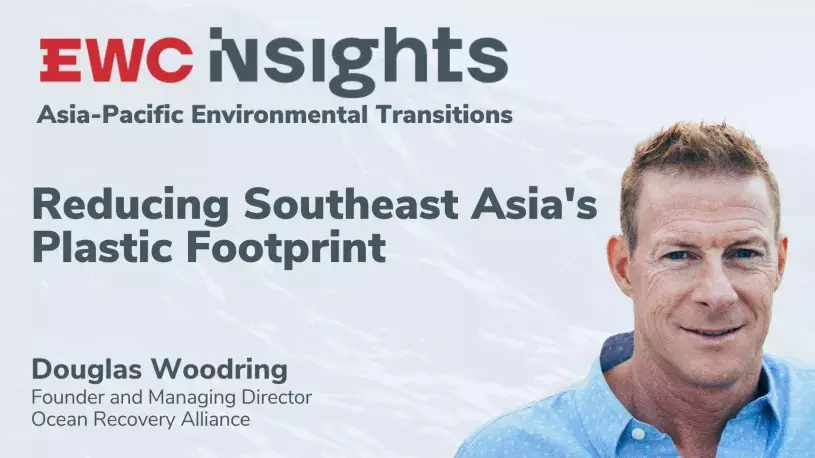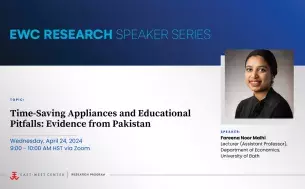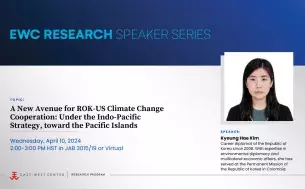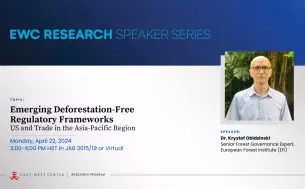Error message

EWC Insights presents
"Reducing Southeast Asia's Plastic Footprint"
Regional Issues and Opportunities Unwrapped
featuring
Douglas Woodring
Founder and Managing Director, Ocean Recovery Alliance
An estimated 8 million tons of plastic enters the ocean each year – a large number, but dwarfed by the roughly 4.9 billion tons of plastic waste dumped on land and sea since 1950. The cause: 50 years of disposable plastic products and packaging, with globally inadequate investment in low-waste alternatives and recycling systems. Consumers do not pay – and few companies voluntarily shoulder the full cost of preventing or cleaning up the waste produced by their products. A key barrier to both investment and the rapid adoption of better solutions and policies remains sheer cost. Today, the world faces immense challenges with closing “cleaner” borders, and the lack of financial incentives to drive significant change.
Take a deep-dive into the background of how we got to the state-of-the-union we face today, with a world almost literally wrapped in plastic from all corners of the world, with few signs of significant abatement… yet. Luckily, the world has now woken to the vast impact and complexities that plastic pollution brings to our communities and environments, and this is where many opportunities lie in waiting for those who can find ways to modify collection and value-added uses for plastic in its second life, creating a world without the plastic footprint we have today. The world is moving quickly on this topic, including with global commitments with aggressive goalposts, but is it going to be enough? Learn what some of the touch-points are for our communities, how we can be engaged on the topic with consumer bases, and how you might be able to tap some of the solutions and ideas that can help your business, or community, with reduced waste streams along the way.
About the Speaker:
Douglas Woodring is the founder and managing director of Ocean Recovery Alliance, a non-profit organization which is focused on bringing together innovative solutions, technology, collaborations and policy to create positive improvements for the health of the ocean. Two of its global programs were launched at the Clinton Global Initiative, and in 2018 he was awarded the Prince’s Prize for Innovative Philanthropy in Monaco. He founded the Plasticity Forum on innovations for plastic in its second life, is a UN Climate Hero, a Google Earth Hero, and has worked with both UN Environment and the World Bank on plastic pollution issues. In 2020 he co-founded the Commitments Accelerator for Plastic Pollution (CAPP), which is a global incubator for plastic waste reduction programs.
Born in Northern California, Mr. Woodring has worked in Asia for over 25 years, and has a dual master’s degree from The Wharton School (MBA) and Johns Hopkins University, School of Advanced International Studies (SAIS) in Environmental Economics, with a BA from the University of California at Berkeley. He was also inducted into the Int’l Marathon Swimming Hall of Fame in 2020 for his innovative contributions to the sport in running some of Asia’s largest ocean swimming events for 15 years.
EWC Insights presents
"Reducing Southeast Asia's Plastic Footprint"
Regional Issues and Opportunities Unwrapped
featuring
Douglas Woodring
Founder and Managing Director, Ocean Recovery Alliance
An estimated 8 million tons of plastic enters the ocean each year – a large number, but dwarfed by the roughly 4.9 billion tons of plastic waste dumped on land and sea since 1950. The cause: 50 years of disposable plastic products and packaging, with globally inadequate investment in low-waste alternatives and recycling systems. Consumers do not pay – and few companies voluntarily shoulder the full cost of preventing or cleaning up the waste produced by their products. A key barrier to both investment and the rapid adoption of better solutions and policies remains sheer cost. Today, the world faces immense challenges with closing “cleaner” borders, and the lack of financial incentives to drive significant change.
Take a deep-dive into the background of how we got to the state-of-the-union we face today, with a world almost literally wrapped in plastic from all corners of the world, with few signs of significant abatement… yet. Luckily, the world has now woken to the vast impact and complexities that plastic pollution brings to our communities and environments, and this is where many opportunities lie in waiting for those who can find ways to modify collection and value-added uses for plastic in its second life, creating a world without the plastic footprint we have today. The world is moving quickly on this topic, including with global commitments with aggressive goalposts, but is it going to be enough? Learn what some of the touch-points are for our communities, how we can be engaged on the topic with consumer bases, and how you might be able to tap some of the solutions and ideas that can help your business, or community, with reduced waste streams along the way.
About the Speaker:
Douglas Woodring is the founder and managing director of Ocean Recovery Alliance, a non-profit organization which is focused on bringing together innovative solutions, technology, collaborations and policy to create positive improvements for the health of the ocean. Two of its global programs were launched at the Clinton Global Initiative, and in 2018 he was awarded the Prince’s Prize for Innovative Philanthropy in Monaco. He founded the Plasticity Forum on innovations for plastic in its second life, is a UN Climate Hero, a Google Earth Hero, and has worked with both UN Environment and the World Bank on plastic pollution issues. In 2020 he co-founded the Commitments Accelerator for Plastic Pollution (CAPP), which is a global incubator for plastic waste reduction programs.
Born in Northern California, Mr. Woodring has worked in Asia for over 25 years, and has a dual master’s degree from The Wharton School (MBA) and Johns Hopkins University, School of Advanced International Studies (SAIS) in Environmental Economics, with a BA from the University of California at Berkeley. He was also inducted into the Int’l Marathon Swimming Hall of Fame in 2020 for his innovative contributions to the sport in running some of Asia’s largest ocean swimming events for 15 years.









